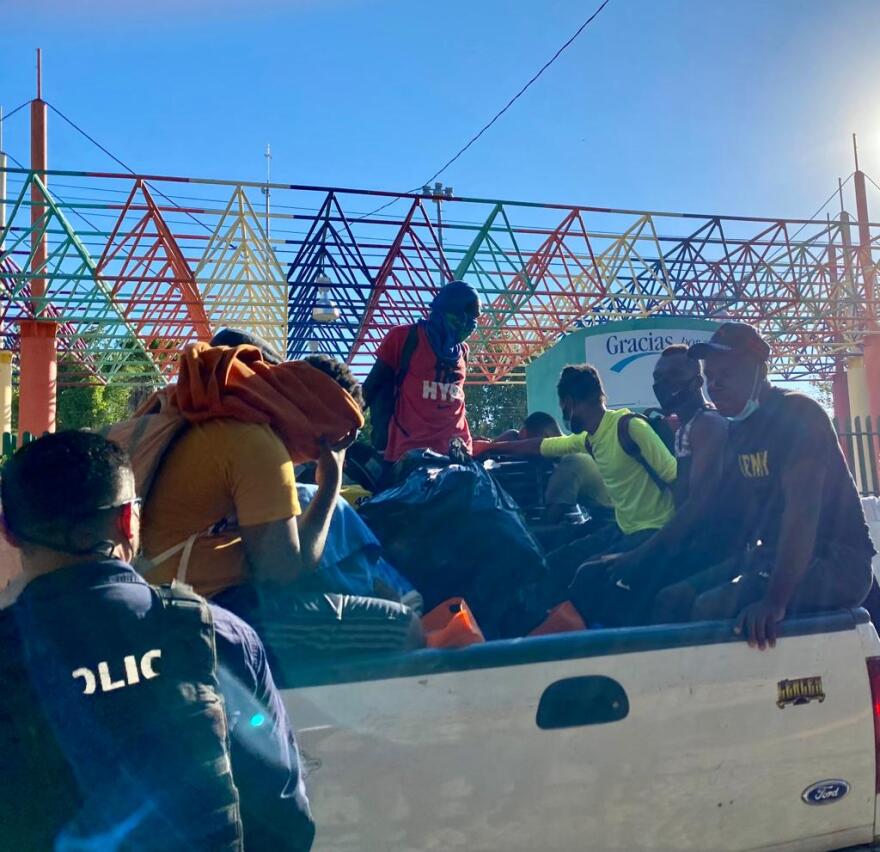You can read this story in English by clicking here.
The Del Rio International Bridge has now reopened to essential travel and trade.
More than $2.8 billion in goods passed through the bridge between Del Rio, Texas and Ciudad Acuña, Mexico since January. It was shut down for more than a week when as many as 16,000 migrants — mostly from Haiti — set up an impromptu camp underneath the bridge.
Over the past week, the U.S. government relocated thousands of migrants— many on flights back to Haiti — and the massive camp has been emptied out.
Luis Angel Urruza, president of the National Chamber of Commerce in Ciudad Acuña, said the reopening could not have come soon enough because anything longer would have been an economic disaster.
“There would have been a huge collapse, and immediately small businesses would close,” he said.
This weekend, Mexican police in Ciudad Acuña pushed migrants out of a camp there into a temporary shelter.
TPR spoke with a Haitian woman at the camp named Betania. Fearing retaliation, she asked we only use her first name. Betania said the Mexican police make her nervous.
“You can’t really sleep in the camp. I am in God’s hands alone,” she said.
Around 250 Haitian migrants eventually agreed to leave their camp in a public park in Ciudad Acuña and go to “Salon Fandango” — an abandoned event venue — to be housed.
The Mexican immigration authorities have offered the Haitian population from the Ciudad Acuña camp to relocate here. El Salón Fandango, an old dance hall now in ruins #Haitians #Migration pic.twitter.com/aNSWRdkseH
— Stephania Corpi (@StephCorpi) September 24, 2021
However, when the first van arrived at the temporary shelter, much of the building was lacking a roof. There were no showers. Mattresses would come later in the day.

Gerardo Ledesma, Pastor of Casa de Alabanza, brought food to the migrants at the shelter.
"I'm seeing the need. The authorities have not provided the support until now that they have moved them here," he told TPR.
Ledesma accused the U.S. and Mexican governments of rushing to clear the camps and harassing the migrants.
These migrants were part of an earlier exodus from Haiti to South and Central America.
The question now is whether more Haitian migrants will try and head north.
An early indication comes from Central America. Each day, an estimated 2,500 Haitians are arriving by land in Panama from South America. From there, many of the migrants continue to Mexico — and they hope to the United States.
The U.S. Special Envoy to Haiti Daniel Foote resigned in protest over the federal government’s handling of the situation in Del Rio.
The Biden administration in May granted Haitians living within the United States Temporary Protected Status (TPS). Since then, the island nation has been devastated by political unrest and an earthquake. However, the administration said TPS does not apply to Haitian nationals who have attempted to travel to the U.S. since May.
The Biden administration has boarded many of the migrants onto flights, sending them back to Haiti under a Trump era-policy of expelling migrants to stop the spread of COVID-19. Immigrant rights activists call this policy illegal because the expulsions do not allow for a lawful asylum process and migrants are no more likely to spread disease than anyone else.





